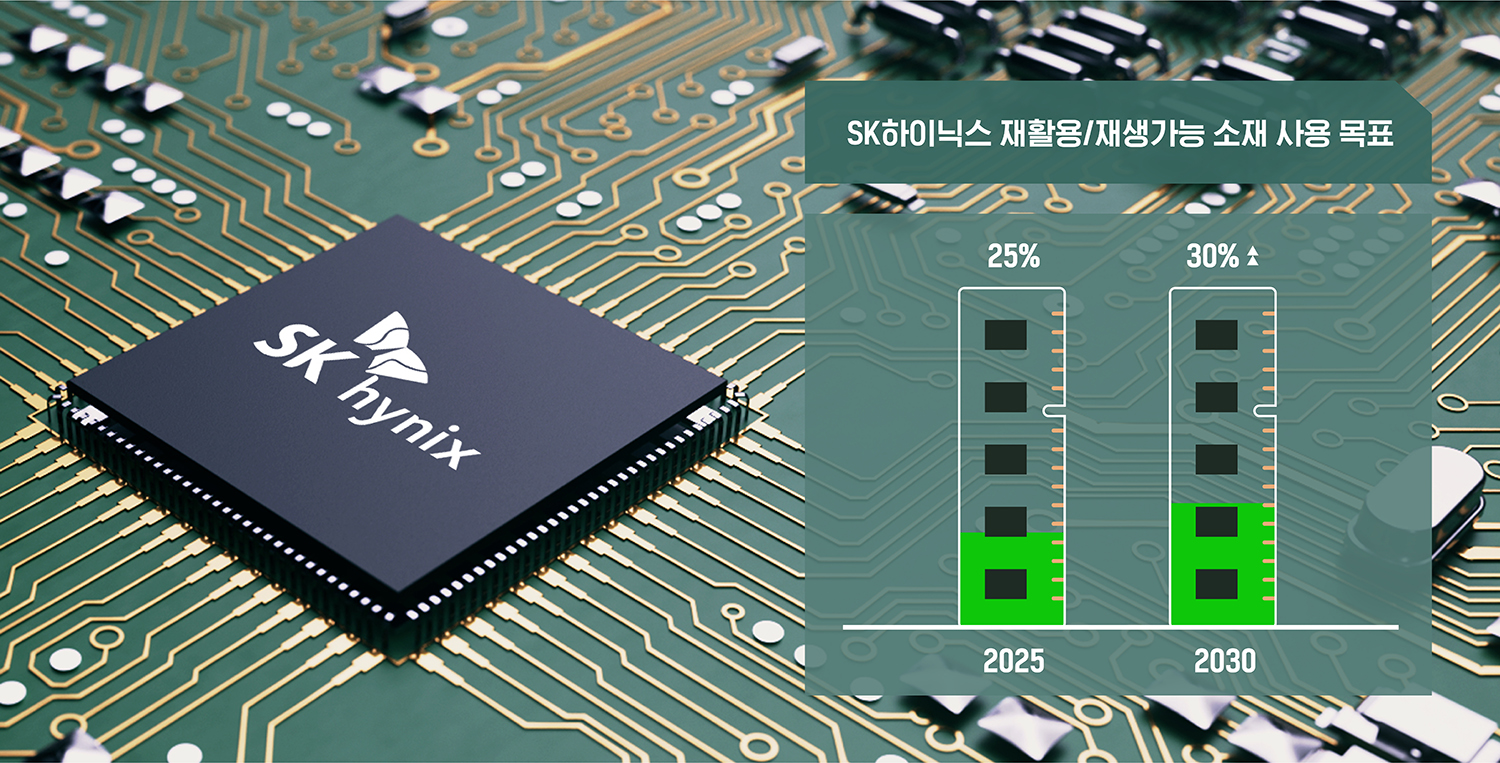AI 반도체 흥행으로 몸값이 높아지고 있는 SK하이닉스가 재활용 소재 사용 로드맵을 발표하며 ESG 측면에서도 미래를 대비하고 있는 모습을 보였다.

▲재활용 소재 사용 비율 2025년까지 25%, 2030년까지는 30% 이상(이미지:SK하이닉스)
재활용 소재 사용 비율 2030년까지 30%↑
AI 반도체 흥행으로 몸값이 높아지고 있는 SK하이닉스가 재활용 소재 사용 로드맵을 발표하며 ESG 측면에서도 미래를 대비하고 있는 모습을 보였다.
SK하이닉스가 글로벌 반도체 기업 최초로 재활용, 재생가능 소재를 제품 생산에 적극 활용하기 위한 중장기 계획을 수립했다고 6일 발표했다.
여기서 재활용 소재(Recycled Materials)는 제조 공정에서 발생하는 폐기물 또는 사용 후 폐기된 제품에서 추출, 회수, 재가공된 소재이며, 재생가능 소재는 자연에서 유래하며 시간이 지나면 자연적으로 재생 가능해 궁극적으로 고갈되지 않는 지속 가능한 목재 등의 소재를 뜻한다.
SK하이닉스는 “넷제로(Net Zero, 탄소중립)를 달성하기 위해 자원 재활용을 중심으로 한 ‘순환경제’ 시스템이 전세계 국가와 기업들에게 중요한 과제가 됐다”며, “이런 흐름에 맞춰 당사는 재활용 소재 사용 비중을 단계적으로 확대하는 목표를 선제적으로 수립하고 이행해가기로 했다”고 밝혔다.
SK하이닉스는 이번 로드맵을 통해 회사가 생산하는 제품에서 재활용 소재가 사용되는 비율을 2025년까지 25%, 2030년까지는 30% 이상(중량 기준)으로 높이겠다는 목표를 수립했다.
이를 위해 회사는 반도체 생산에 들어가는 필수 소재인 구리, 주석, 금 등 일부 금속 소재부터 재활용 소재로 전환하기로 했다. 금속 소재는 메모리 반도체 완제품 중량에서 차지하는 비중이 크고, 다른 소재로 대체하기도 어려워 재활용 시 자원 순환 측면에서 효과가 가장 크다는 게 업계 분석이다.
또한 회사는 반도체 완성품을 보호하기 위해 사용하는 플라스틱 포장재를 재활용 플라스틱으로 교체하는 등 자원 순환을 실천하기 위한 전방위 노력에 나선다.
SK하이닉스는 로드맵 목표를 달성하기 위한 이행 체제도 정비했다.
회사가 직접 구매하는 재활용 소재에 대해 인증 절차와 품질 평가를 강화하고, 협력사가 납품하는 부품 소재도 품질 평가서를 제공받아 검토한 후 적용 여부를 결정하기로 했다. SK하이닉스는 ISO 14021 등 공신력 있는 외부기관의 재활용 소재 사용 비율 검증 및 인증에 협력사들도 동참하도록 소통할 예정이라고 밝혔다.
SK하이닉스 송준호 부사장(선행품질&분석 담당)은 “ESG 경영에 힘쓰는 기업으로서, 당사는 글로벌 순환경제 구축에 적극 동참하고자 한다”며, “로드맵을 실천하면서 고객과 협력사 등 반도체 공급망 내 모든 이해관계자들과 힘을 합쳐 실질적인 성과를 낼 수 있도록 하겠다”고 말했다.
